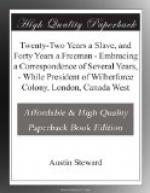As soon as practicable therefore, I left Rochester for Toronto, the capital of Upper Canada, which I found quite a thriving town, and containing some fine brick buildings, and some I saw were built of mud, dried in the sun, wearing rather a poor than pretty appearance. At Toronto we hired a team to take us on to Ancaster, fifty miles distant. We traveled now through a new country; the roads were very bad, and the inhabitants few. We, however, reached Ancaster, a small village, where we remained one night and next morning pursued our journey to the settlement of the poor fugitives from Cincinnati. After some hard traveling, we finally arrived at the place where we found our brethren, it is true, but in quite destitute circumstances. Our fare was poor indeed, but as good as they could get. The township was one unbroken wilderness when purchased for the colony, and of course their lands must be cleared of the heavy timber before crops could be got in, hence, there was a great deal of destitution and suffering before their harvest could ripen after the land was prepared for the seed.
The day after I arrived at the settlement, which consisted of a few rude log cabins, a meeting was called to give the township a name. Several were suggested, but I at length motioned to name it in honor of the great philanthropist, Wilberforce. This was carried, and the township from that time has been known by that name. It is situated on what is known as the Huron Tract, Kent County, London District, and is the next north of the township of London. Our neighbors on the south, were a company of Irish people, who owned the township, and on the west side were a township of Welshmen, a hardy, industrious and enterprising people.
In Wilberforce there were no white inhabitants; the land appeared level and handsome, with but one stream of any magnitude running through it; this was the Oxsable, which was dry during a part of the year. All was one vast forest of heavy timber, that would compare well with that of Western New York. Beech, maple, ash, elm, oak, whitewood, bass, balm of gilead, &c. The soil was good for corn, wheat, rye, oats, and most kinds of the grain and vegetables raised in New York, and was a superior grazing country, about fifteen miles from London. This was a village containing perhaps thirty dwellings, and two hundred inhabitants; a court-house and jail all under one roof, built of stone and plastered; small doors and windows in the style of some of the old English castles. London was built in the forks, or between the east and west branches of the river Thames; hence, you would hear people speak of “going to the forks,” instead of the village; it is about two hundred miles from Buffalo, and the nearest port between the two is Port Stanley, thirty miles from London.
I returned from Canada, where I had seen an oppressed people struggling with the hardships and privations of a new settlement; I had seen wretchedness in some places, but by no means sufficient to justify the report made by Mr. Lewis, and I determined I would remove there with my family, and do all in my power to assist the colored people in Canada.




